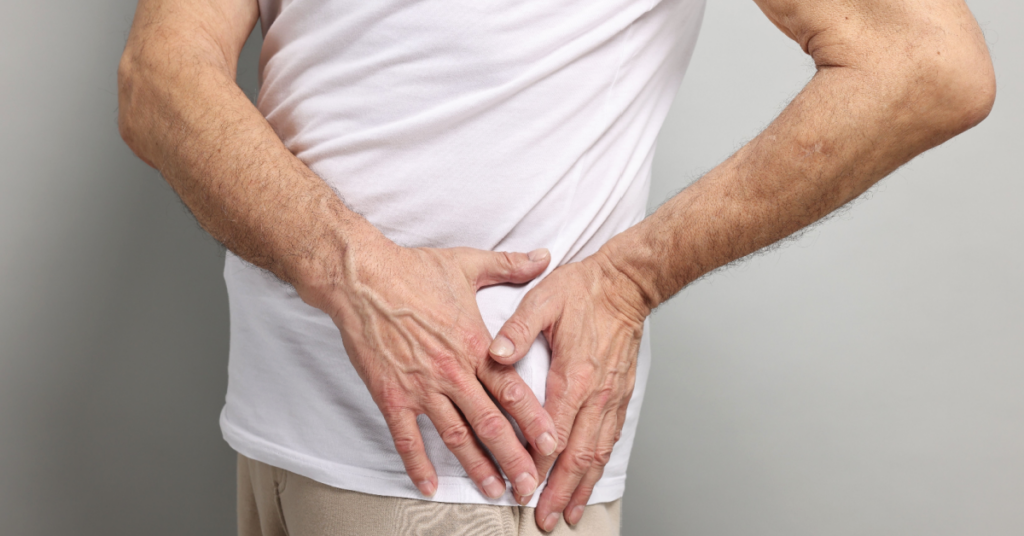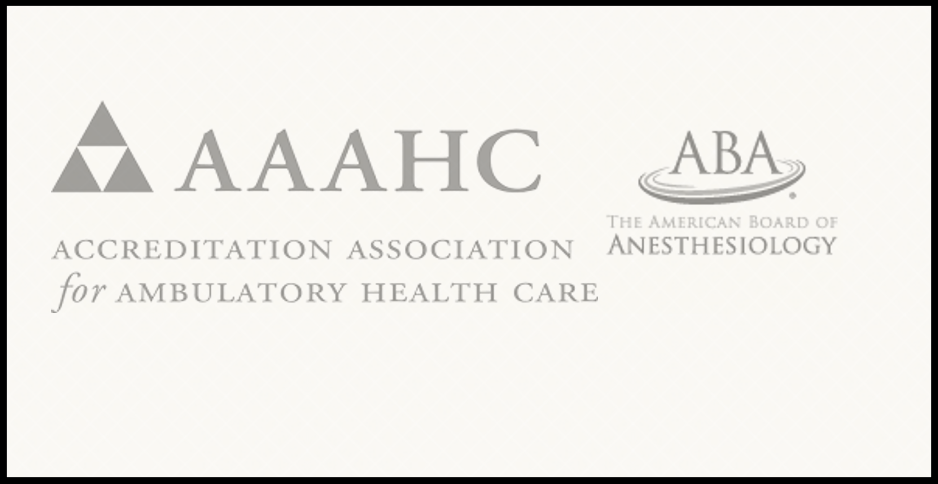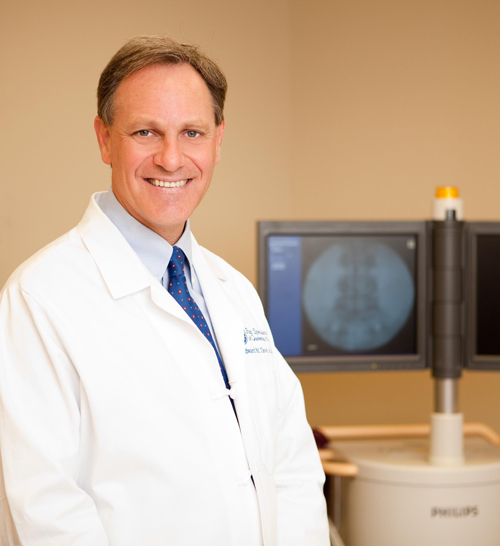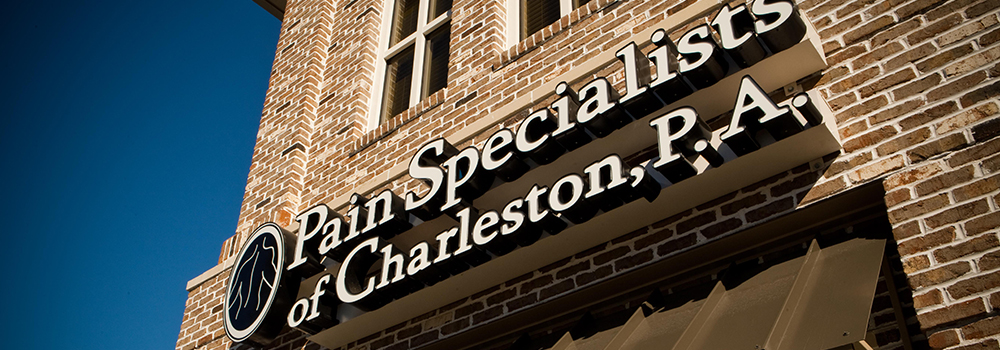Hip Pain

HIP PAIN PHYSICIAN IN CHARLESTON, SC
Hip pain refers to any pain in or around your hip joint. It is extremely common, especially in older adults. Thankfully, hip pain is very treatable and not typically an indicator of a more serious issue.
Hip pain can be acute–meaning short-term–or chronic, usually resulting from an injury. The severity of the pain and recommended treatments depend on which part of your hip joint is damaged.
At Pain Specialists of Charleston, we’re here to help diagnose and treat your hip pain so you can live a pain-free lifestyle.
No Referral Needed — Same Day Appointments — Accepting New Patients
Request Appointment | Meet Pain Doctors | Contact Us | Visit Us
SIGNS & SYMPTOMS
In addition to feeling pain, you may also experience a limited range of motion, clicking or popping, swelling, or stiffness in your hip. These symptoms may also have symptoms in any of the areas around your hip, including your:
- Thigh
- Inner or outer hip joint
- Groin
- Buttocks
In addition, pain from the back or groin may travel to your hip. Your pain may get worse with exercise or activity, especially if you are struggling with arthritis.
WHEN TO SEE A DOCTOR
While hip pain can be as simple as tendonitis caused by overuse or a more serious condition like osteoarthritis. If the pain persists or is accompanied by swelling, redness, or warmth around the joint, contact your doctor as soon as possible.
Seek immediate medical attention if:
- Hip pain comes on suddenly or is intense
- You have a fall or injury that resulted in hip pain
- The joint is bleeding or distorted
- There is a popping noise, especially if you have injured it
- Your hip cannot bear weight
- You’ve lost the ability to move your leg or hip
CAUSES
Arthritis
Arthritis is one of the most common causes of hip pain. As we age, the cartilage–which cushions the ball of your hip joint–wears down. This makes the space between the ball and socket of your hip joint smaller, eventually resulting in bone running against bone. The result is stiffness, reduced range of motion, and pain.
Avascular Necrosis
Avascular necrosis–also known as osteonecrosis–occurs when blood flow to the hip bone slows down and bone tissue dies. This is usually the result of a hip dislocation or fracture but can also happen in patients who have used steroids long-term. While this condition can happen in other bones, it is most common in the hip.
Bursitis
Between tissues like bone, muscles, and tendons, there are sacs of liquid called bursae. These cushion the space and reduce the friction between the tissues. Bursae can become inflamed by repetitive motion or overwork, which causes pain in the hip.
Cancers
While cancer is not a common cause of hip pain, tumors can start in or spread to bones, causing hip pain.
Hip Fractures
As we age, our bones weaken and become brittle, making them more likely to break during a fall. A hip fracture or break can cause pain even after you have healed.
Hip Labral Tear
This is a rip in the labrum, which is a ring of cartilage around the outside rim of the socket of your hip joint. Think of it as a rubber seal that helps hold the ball portion of the hip joint in the socket. If you are an athlete or perform repetitive twisting motions, you are at a higher risk of a labral tear.
Muscle or Tendon Strain
Repeated motion or physical activity puts strain on the muscles, tendons, and ligaments in and around the hips. This causes pain and can limit the movement of your hip.
Tendonitis
Bones are attached to muscles with thick bands called tendons. When tendons become inflamed or irritated–usually from overuse–it is called tendonitis.
DIAGNOSIS
- Physical Exam: At Pain Specialists of Charleston, your first visit will include a thorough evaluation that includes your medical history and a physical examination pertinent to your pain problem. This comprehensive visit with your pain management physician will last approximately 30 minutes.
- MRI: Our team offers board-certified radiologists to examine your body for medical conditions using advanced magnetic resonance imaging (MRI). The scan is a noninvasive medical imaging test that will show detailed images of the inner structure of your body, including bones, muscles, organs to blood vessels. No referral needed!
- Additional Imaging Test (CT Scan, X-ray etc.)
TREATMENT
At Pain Specialists of Charleston, our board-certified team offers pain management treatment in the form of:
- Injections
- Injured Nerve Block
- Radiofrequency Ablation (Rhizotomy)
- Discography
- Neurostimulation, also known as Spinal Cord Stimulation
- Medical Massage Therapy
- Clinical Trials
- …and MORE!
MEET DOCTOR EDWARD M. TAVEL, JR., MD
- Over 20+ Years of Specialty Training
- Double Board-Certified in Anesthesiology and Pain Management
AWARDS & ASSOCIATIONS

AS SEEN ON

CONDITIONS WE MANAGE
- Knee Pain
- Chest Pain
- Shoulder Pain
- Back Pain
- Hip Pain
- Neck Pain
- & More
TREATMENTS WE OFFER
- Acupuncture
- Biofeedback
- Cognitive behavioral therapy
- Massage
- Meditation
- & More
WHY CHOOSE US
At Pain Specialists of Charleston, we strive to provide an unmatched healthcare experience that is focused on finding relief. With this goal guiding our pain management physicians, we prioritize the following:
Compassionate and Comprehensive Care
Our practice takes a multidisciplinary approach to pain care that puts patients first. We’re proud to offer a full range of pain management procedures and treatments, including physical therapy, medical massage therapy, pain psychology, medication management, and more.
Timely Treatment
Because many of our patients suffer from severe pain, we’re committed to scheduling appointments as quickly as possible. This ensures the speedy start of a treatment plan to relieve and/or manage their pain.
Access to Safe Pain Management
Pain Specialists of Charleston offers a higher level of healthcare, performing all interventional procedures to meet strict, sterile standards and rigorously comply with all FDA, CDC, state, and federal medical safety guidelines.
Quality Care
Our providers are not only prominent leaders in the field of pain management, but advocates for the Charleston, SC patients we so proudly serve. It’s our exceptional care that sets us apart and earns our patients’ trust.
FAQS
SHOULD I BE RESTING OR EXERCISING TO IMPROVE HIP PAIN?
Low-impact exercises are a good way to stay in shape without making your hip pain worse. Activities like water aerobics, swimming, yoga, and biking are all fantastic choices if you want to stay–or get–active while dealing with hip pain.
HOW SHOULD I SLEEP WITH CHRONIC HIP PAIN?
Sleeping on your back is the best position for those with hip pain. You can try putting a pillow between your knees or behind your back to further relieve pressure on your hips and keep them aligned.
WHAT IS OFTEN MISTAKEN FOR HIP PAIN?
Since the hips are close to the spine, lower back pain can be mistaken for hip pain.
WHAT SHOULD YOU AVOID DOING IF YOU HAVE HIP PAIN?
If you have hip pain, try to keep direct pressure off of your hip and avoid bending at the hip repeatedly. In addition, do not sleep on the affected side or sit for prolonged periods.
WHAT ARE COMMON RED FLAGS WITH HIP PAIN?
Hip pain with any of the following symptoms is a red flag and necessitates medical attention:
- Pain that comes on suddenly
- A history of trauma
- Swelling or deformity of the hip
- The inability to bear weight
- Lumps or bumps in the groin
- Pulsations in the groin
- Vomiting or constipation
- Blood in your urine
- Fever
- Weakness, tingling, or numbness in the legs and/or feet
- Swollen testicles
- Night sweats
- Appetite loss and unintentional weight loss
- A history of cancer
HOW DO YOU KNOW IF HIP PAIN IS RELATED TO MUSCLES OR JOINTS?
If you have pain on the inside of your hip or in your groin, it is likely an issue with the hip joint itself. Pin on the outer hip, upper thigh, or buttocks usually signifies a problem with your muscles, ligaments, or tendons.
WHAT IS THE COMMON DIAGNOSIS RELATED TO HIP PAIN?
Hip pain can be caused by a wide range of conditions, few of which are serious. Arthritis, muscle strains, bursitis, and pinched nerves are all common causes of hip pain. Rarely, hip pain is associated with metastatic cancer, bone cancer, and leukemia.
WHAT ARE THE SYMPTOMS OF WORN HIP JOINT?
Signs that your hip joint is worn include:
- Pain in or near the hip that worsens with movements and exercises
- Hip stiffness, which makes it difficult to move your leg
- Cracking, crunching, clicking, or snapping sounds from your hip
- Weakness in the hip
WHAT IS THE BEST TEST FOR HIP PAIN?
The log roll test is the most specific test when evaluating hip pain. This involves laying on the medical table and allowing your pain management physician to roll your thigh internally and externally as they examine your mobility and any noises that come with the movements.
SHOULD I BE WALKING WITH HIP PAIN?
Light exercises like daily walks and swimming are a great way to stay healthy and strengthen other muscles in the body. Continuing to exercise once your pain has cleared up will help keep pain at bay.
WHAT AGE DO YOU START GETTING HIP ARTHRITIS?
Most patients start seeing osteoarthritis in the hip once they are over the age of 45. This condition is more common in women than men, especially if you have a job that involves heavy lifting or prolonged periods of standing.
IS MY HIP ISSUE ARTHRITIS OR TENDONITIS?
Hip arthritis will limit your range of motion, whereas tendonitis typically results in tenderness with no loss of movement. You will feel tendonitis on the outer part of the hip, where arthritis hurts in the interior of the hip.
WHAT IS SNAPPING HIP SYNDROME?
With snapping hip syndrome, you will feel something catching or hear clicking in your hip when you move it. This condition isn’t always painful.
WHAT HAPPENS DURING YOUR FIRST APPOINTMENT AT PAIN SPECIALISTS OF CHARLESTON?
At your first appointment, you will discuss your hip pain with your pain management specialist. They will perform a physical exam and may order additional tests and imaging to get a better idea of your condition. From there, they will be able to recommend treatment(s) to ease your pain. What Should I Bring?
ARE YOU ACCEPT NEW PATIENTS?
Yes, we are open to new patients. Call us at (843) 818-1181 today or request an appointment online.
DOES PAIN SPECIALISTS OF CHARLESTON REQUIRE A REFERRAL?
No, we accept both self-made and referral appointments. Schedule your first appointment today!
DOES PAIN SPECIALISTS OF CHARLESTON OFFER SAME-DAY APPOINTMENTS?
Yes, Pain Specialists of Charleston offers same-day appointments. We are open 5 days a week. To learn more about availability, call us at (843) 818-1181.
HOW LONG IS A PAIN MANAGEMENT APPOINTMENT?
Your first visit with your pain management specialist will last approximately 30 minutes. Subsequent appointments will vary in length depending on the treatment(s) you are undergoing. What else should new patients expect?


